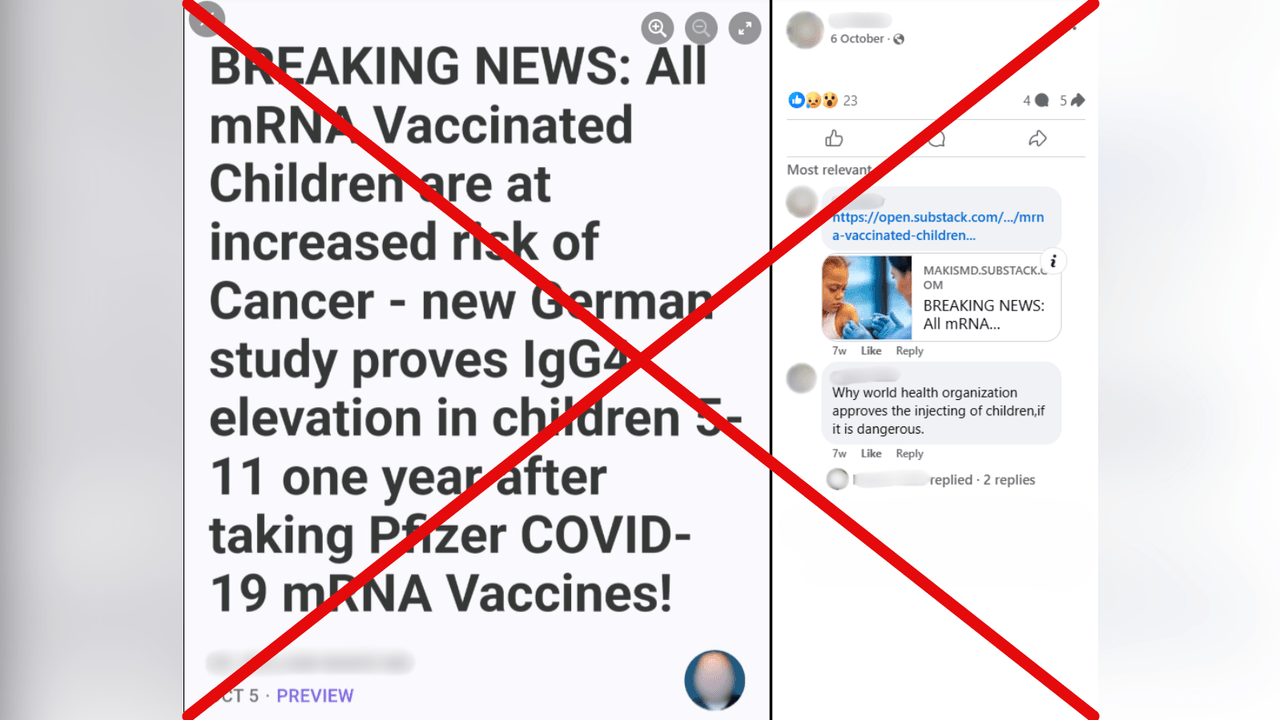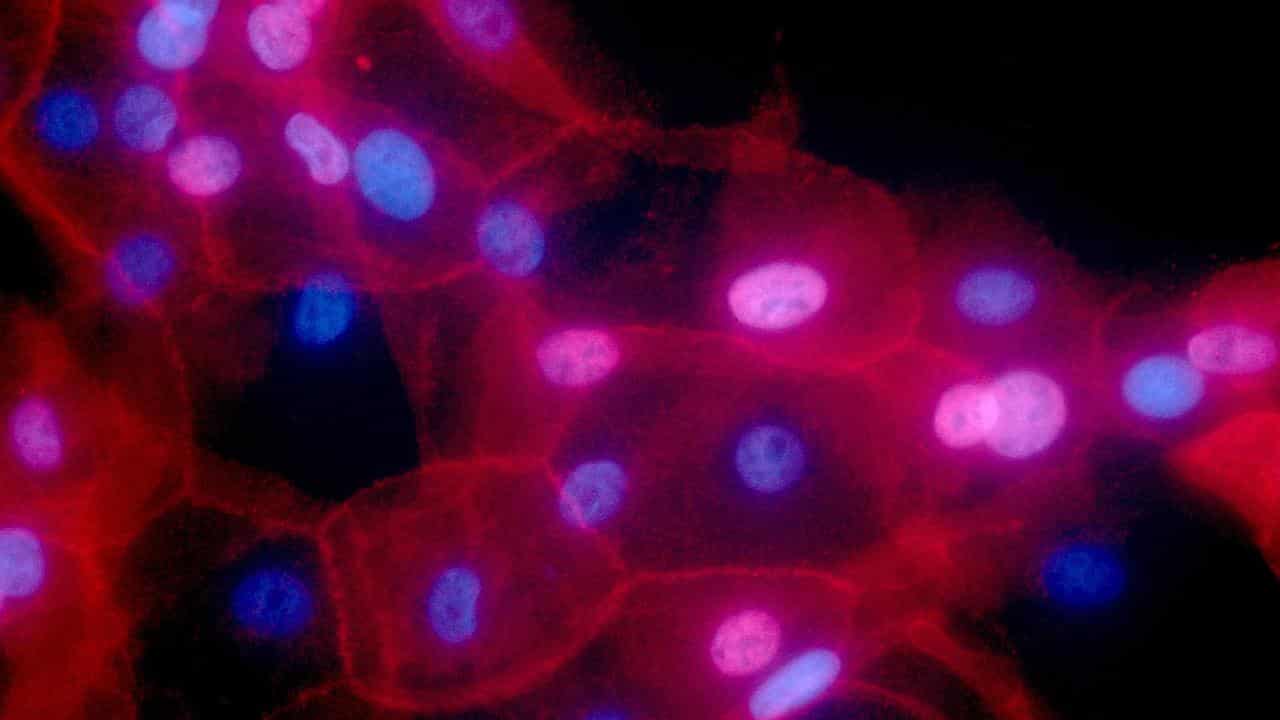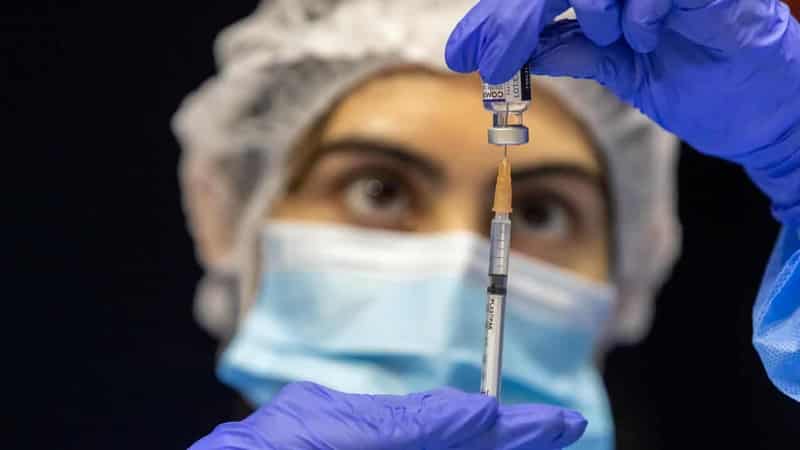
What was claimed
A study found mRNA COVID-19 vaccines increase the risk of cancer in children.
Our verdict
False. The study did not show COVID-19 vaccines increase cancer risk.
AAP FACTCHECK - A study looking at immune responses to COVID-19 vaccination in children did not find the shots increased their risk of cancer, despite claims being made online.
While the study did find a spike in a specific antibody after repeated doses, it made no findings about that response being linked to an increased risk of cancer, nor suggested this was the case.
The claim appears in a Facebook post that includes a screenshot of a Substack article by a former physician who has previously made anti-vaccination statements.

“BREAKING NEWS: All mRNA Vaccinated Children are at increased risk of Cancer - new German study proves IgG4 elevation in children 5-11 one year after taking Pfizer COVID-19 mRNA Vaccines!” the Substack headline reads.
The article refers to a 2024 German study on whether a specific antibody had increased in children after COVID-19 vaccination, published in The Pediatric Infectious Disease Journal.
Antibodies, also known as immunoglobulins (Ig), are produced by the immune system to find and fight antigens such as bacteria and viruses.
There are five antibody classes - IgM, IgA, IgD, IgE and IgG. The IgG class has four further subclasses.
The study focused on the least common IgG subclass, IgG4, and involved 14 healthy children aged five to 11 who received two doses of Pfizer’s vaccine.
Blood samples were collected on the day of the first dose, five weeks later and then one year after the second dose (page 1201).
The researchers found IgG4 levels increased after vaccination and concluded a better understanding of the antibody response is crucial, particularly in the context of mRNA vaccination (p1202).
However, they did not determine or investigate if these increased levels impacted the immune system or could lead to cancer.

The Substack article argued that “when the immune system is dominated by IgG4 antibodies, the body may be less able to fight off cancer”.
It cited a Nature Reviews Immunology article that suggested IgG4 could block anti-tumour responses from other antibodies, and a 2022 Sun Yat-sen Memorial Hospital study which said individuals with IgG4-related disease appeared to have a higher cancer risk.
“All children ages 5-11 years old who took Pfizer COVID-19 mRNA Vaccines were found to have elevated IgG4 levels at 1 year after 2nd dose, which means their risk of developing Cancer is increased,” the claim’s author concluded.
But the 2024 IgG4 study’s co-author, Dr Robin Kobbe, said his findings have been misinterpreted.
“Our study just reports on an increase of a specific type of antibodies, the IgG4, in children - after it has already been reported to go up in adults! That does not mean that this is bad at all,” he told Logically Facts.
“The increase in IgG4 levels might be important in the prevention of other diseases by mRNA vaccines in the future, which is what the study wanted to address.”
Shiv Pillai, a professor of medicine at Harvard Medical School, said IgG4 was an anti-inflammatory antibody produced following repeated exposure to antigens, including some vaccines.
“There is no real data that IgG4 levels have anything to do with cancer,” he told AAP FactCheck.
“Theoretically if they did anything they might reduce inflammation and therefore reduce the risk of cancer, but in reality there’s no data that suggests this or any causal connection or association of any immunoglobulin class to cancer."

Maartje Huijbers, an associate professor of genetics and neurology at Leiden University, said several studies have shown COVID vaccines can elicit an IgG4 increase in both children and adults following repeated vaccination.
But she noted the study by Dr Kobbe does not mention any association with cancer.
“Frankly, this is to me a ludicrous statement which is very harmful to public health as it misinforms the general public," Dr Huijbers told AAP FactCheck.
She said it was true that higher IgG4 levels were often seen in patients with IgG4-related disease, a rare inflammatory condition - but that doesn’t mean an individual with high IgG4 levels has the disease.
Dr Huijbers also said she was unaware of evidence showing a connection between getting a COVID vaccine and developing IgG4-related disease.
Some reports suggest IgG4 could worsen disease progression in cancer patients because its anti-inflammatory properties may block the responses of other antibodies - for example IgG1 or IgG3 - which are better at fighting tumours.
However, William Petri, a professor of medicine at the University of Virginia, said this was inconclusive.
“There’s no proof of an anti-cancer effect of IgG4 antibodies in someone who has cancer, and zero evidence that IgG4 antibodies raised by the vaccine would cause cancer,” he told AAP FactCheck.
Dr Huijbers added that an IgG4 response triggered by the COVID vaccination would not affect tumour growth in cancer patients because the antibodies are directed against a different target.
The Verdict
False – The claim is inaccurate.
AAP FactCheck is an accredited member of the International Fact-Checking Network. To keep up with our latest fact checks, follow us on Facebook, Twitter and Instagram.









